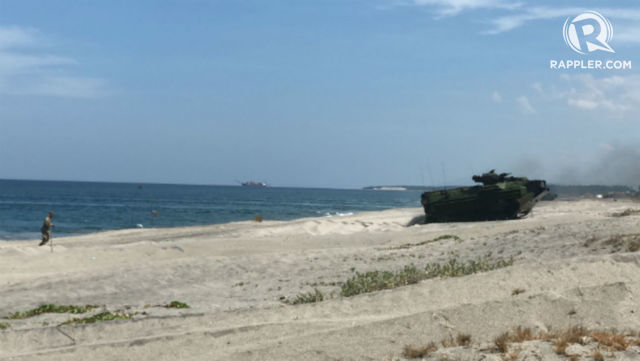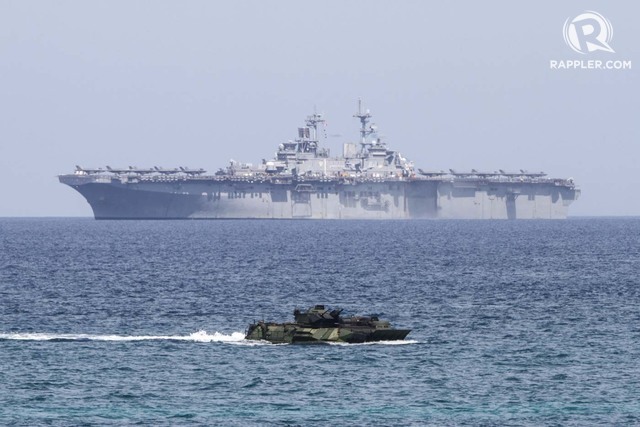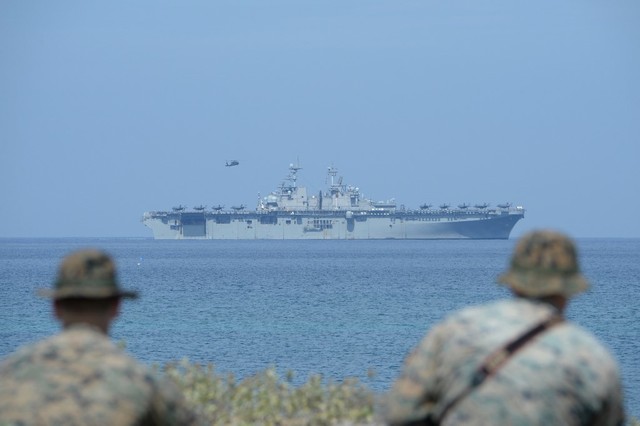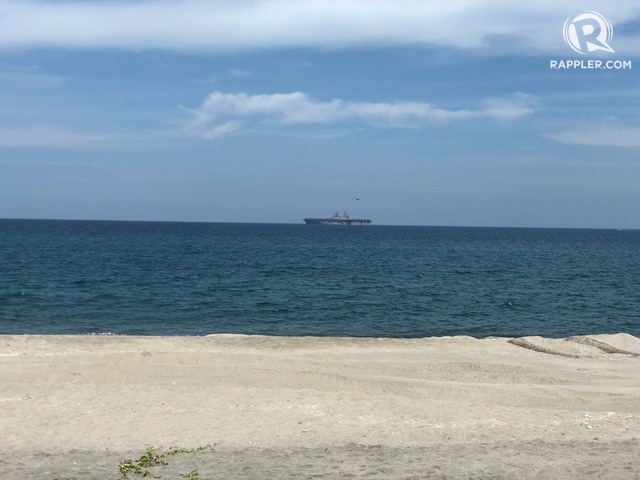From Rappler (Apr 11, 2019):
Balikatan 2019: PH, U.S. forces 'take over' beach in Zambales
Philippine and US forces bring out battle-ready ships and vehicles as they complete an exercise to take control of a shorefront in the Naval Education Training Center in Zambales
COMBINED EXERCISES. Philippine and US armed forces conduct amphibious exercises in San Antonio, Zambales as part of Balikatan 2019. Photo by Sofia Tomacruz/Rappler
ZAMBALES, Philippines – In a naval base facing the West Philippine Sea, Philippine and US troops on Thursday, April 11, descended full force in a mission to take control of the shores from a common enemy.
Aircraft flew overhead, ordnance were dropped on the land below, and over 200 marine corps from the countries’ combined forces arrived from amphibious assault vehicles to lay claim on the North Beach of the Naval Education Training Center in San Antonio, Zambales.
The mission was elaborate. It was also scripted.
The amphibious exercises on Thursday were the last in
Balikatan 2019, a nearly two-week long event where troops from the Philippines, United States, and Australia undergo training that would better prepare them for real battle.
The annual Balikatan 2019, now in its 35th iteration, also aims to strengthen interoperability and reinforce ties between the Philippines and its oldest treaty ally, the US.
What took place: True to its name, the amphibious landing exercise saw Philippine and US marine corps carry out the mission shoulder to shoulder or "balikatan" in Filipino.
The drills, composed of several waves, started at about 9:15 am, with the Philippines’ OV 10 and US’ MV-22 Ospreys aircraft performing simulated close air support. Dropping ordnance, the aircraft set the scene for US and Filipino marines to set foot on shore.
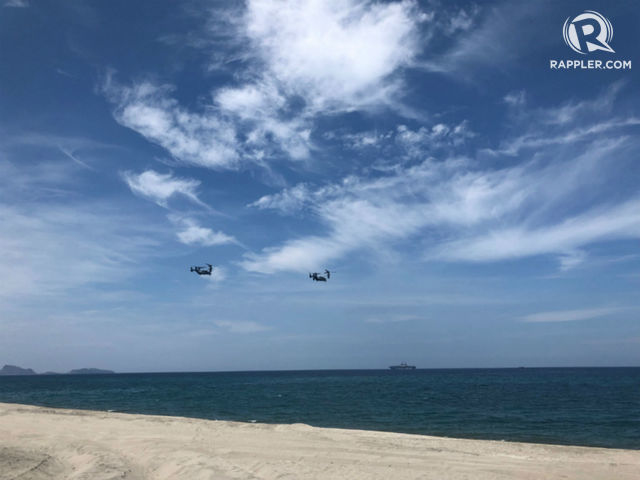 SCRIPTED EXERCISE MV-22 Osprey aircraft from the United States start the first wave of the amphibious exercises in Balikatan 2019. Photo by Sofia Tomacruz/Rappler
SCRIPTED EXERCISE MV-22 Osprey aircraft from the United States start the first wave of the amphibious exercises in Balikatan 2019. Photo by Sofia Tomacruz/Rappler
Other Stories
[ANALYSIS] Balikatan: U.S. shifts gears from counterterrorism to great power competition//Balikatan may yet emerge as the template for multilateral exercises among US and its close allies in the entire Indo-Pacific region
PH, U.S. armed forces open Balikatan 2019//Balikatan 2019 marks one of the biggest in the project's history, involving 4,000 Filipino, 3,500 American, and 50 Australian soldiers
3 Russian warships dock in Manila amid Balikatan//The Philippines welcomes the Russian Navy's 2nd goodwill visit in 2019 amid its ongoing Balikatan joint military exercises with the United States
About 160 US marines then made their way towards land on 7 amphibious assault vehicles (AAVs). The vehicles departed from the US Navy’s USS Wasp, sailed their way to shore, and continued to run on dry land.
From there, some 50 Filipino troops followed on 4 AAVs, which departed from the Philippine Navy’s BRP Tarlac. After this, they carried out combat operations as the main effort to clear out the enemy.
Once this was done, the forces declared victory.
What are the exercises for? One of the biggest takeaway for both countries’ armed forces was preparation for possible future conflict.
The exercises focused on improving interoperability between US and Philippine troopers so both forces grow familiar with the way each one moves and communicates on the battle field.
For the Philippines, the use of AAVs in the exercise also served as training for when its own armed forces receive them for the first time. Four AAVs are expected to arrive from South Korea later this year.
“AAVs [are] used to project combat power from the sea and shore…. The tactics, techniques, and procedures that they [Filipino marine corps] can get from this exercise from the US counterpart will be very beneficial for us,” said Balikatan Public Affairs Director Lieutenant Commander Liezl Vidallon.
US highlight
As for the US, the highlight was the F-35B Lightning II Joint Strike Force (JSF) – the world’s most advanced multi-role stealth aircraft – aboard the USS Wasp. It was the first time the aircraft was featured in the Balikatan exercises.
Though the stealth jets were not deployed and remained onboard the USS Wasp, US Balikatan Exercise Media Officer 2nd Lieutenant Tori Sharpe said the F-35s were brought to the joint exercises for the first time to understand how to “best employ their capabilities” in the Indo-Pacific region.













